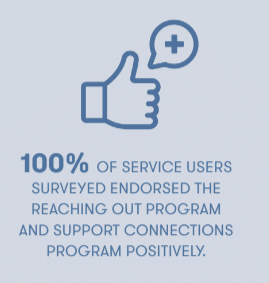a) The Reaching Out Program
People who are experiencing drug dependence and/or have lived experience of drug dependence in the ACT experience stigma, discrimination and ongoing impacts of criminalisation. This leads to a wide range of social and health inequities and requires an integrated approach in providing appropriate health care. Furthermore, assertive outreach services can improve access to health services for individuals unable to access services due to personal circumstances and/or risk of being identified in service settings.
CHN, ACT’s PHN, commissioned Marymead CatholicCare to run the Reaching Out Program. Reaching Out provides Alcohol and Other Drugs (AOD) counselling through assertive outreach, where counsellors meet individuals where they feel most safe and comfortable in the privacy of their home. This person-centred, individualised approach can improve therapeutic alliance between counsellors and their clients, and lead to more holistic and sustainable health outcomes. Due to the impacts of COVID-19, the counselling team has also developed initiatives for providing more flexible delivery of services through telehealth and supporting clients to use digital apps where necessary. Over the last year, 234 new clients accessed the service.
Marymead CatholicCare has continued to provide person-centred and comprehensive counselling services for people experiencing AOD dependence in the ACT. The Reaching Out AOD counsellors provide a high level of individualised support to clients with continuity of care and minimal disruption, despite issues such as the higher rates of cold/flu and COVID-19 in the winter months. A COVID-19 initiative by the team has continued to provide improved client outcomes through the flexible delivery of services, including telehealth and digital apps, where necessary. AOD Counselling includes a wide range of therapeutic approaches and harm reduction strategies, to empower individuals through strengths-based, person-centred care. In this reporting period, 100% of service users surveyed endorsed the service positively; “thanks to my counsellor – she helped change my life”
Client story
Vince* (not his real name) was referred to Reaching Out by the Detox Unit at the Canberra Hospital. Vince had a diagnosis of generalised anxiety disorder and social anxiety, which significantly impacted attempts of reducing his dependence on alcohol. He had medical issues associated with long-term substance use, including hospitalisations for pancreatic and liver issues.
Vince had resumed drinking a month after detox which promoted his engagement in counselling. Vince identified his long-term goal was to “create a sustainable and healthy relationship with alcohol” and, in the short-term, cut back in his overall alcohol consumption.
Therapeutic interventions were strengths-based and included existential themes of navigating life’s uncertainty, while exercising freedom with responsibility. Jorge explored harm reduction measures like drinking with other people instead of alone, slower paced drinking, hydration and planning non-drinking days. He was also able to implement other lifestyle changes, such as a regular gym routine.
Vince’s confidence levels improved in many areas of his life, saying “I’m here, I’m alive and well”. This was a stark contrast to debilitating anxiety and physical illness prior to detox when hospitalisation was needed to restore his health and wellbeing. Vince completed treatment feeling “happy, comfortable and in control.”

b) AOD Support Connections
People who experience drug dependence and/or have lived experience of drug dependence in the ACT experience stigma, discrimination and ongoing impacts of criminalisation. This leads to a wide range of social and health inequities and requires an integrated approach in providing appropriate health care. Many people experiencing AOD dependence need multidisciplinary approaches to providing comprehensive, specialist health care through integrated AOD counselling and case management. Furthermore, outreach services can improve access to health services for individuals unable to access services due to personal circumstances and/or risk of being identified in service settings.
CHN, ACT’s PHN, commissioned Marymead CatholicCare to provide AOD Support Connections. This outreach case management program works in partnership with anyone over 16 who want to stop or reduce their use of alcohol and other drugs. AOD Support Connections Case Manager can assist individuals to make meaningful and sustainable changes to their AOD dependence and broader lifestyles. This includes developing therapeutic alliance to provide holistic, person-centred care; developing crisis and relapse prevention plans; exploring harm reduction strategies to help individuals become more in control of their dependence; and connecting individuals with other community and health services in order to improve their health and wellbeing.
The AOD Support Connections Case Manager continues the provision of holistic support to clients who self-identify problematic use of alcohol and other drugs. This involves collaborative case planning that empowers clients to make changes to their alcohol and other drug use, connect with physical and mental health services, address legal, financial or housing problems, safety plan around domestic and family violence, build formal and informal support networks. The Case Manager has continued to work closely with housing and homelessness services, allied health providers and numerous community agencies to provide holistic and coordinated care for a highly complex client group. This period saw consistency in referral rates; high rates of service user engagement; and stronger stakeholder relationships with other community services. A total number of 101 service users were supported in the last year with 585 occasions of service, and 100% of clients positively endorse the service through CatholicCare AOD Support Connections surveys completed.
Client story
Anna* (not her real name) was referred to AOD Support Connections following a custodial sentence. Prior to incarceration, Anna was experiencing drug dependence and experienced a significant relationship breakdown, resulting in her mother taking over the care of her child.
The AOD Support Connections Case Manager developed a relapse prevention plan in collaboration with Anna, identifying her potential triggers and protective factors. Since engagement with the program, Anna reports sustained abstinence. Additionally, Anna was supported to explore accommodation options, which included writing support letters and advocating on her behalf. Anna has recently signed a lease for a private rental and has regained independent care of her child. She has obtained part-time employment and reports to be reconnecting with social interests and rebuilding relationships with her family and social networks, after many years of isolation.
The Case Manager received the following feedback from Anna’s mother at the end of the support period:
“I would like to take this opportunity to express my deepest gratitude for your support over the past year. (My daughter) has reached a number of important milestones during that time, all of which would not have been possible without your assistance… Thank you from the bottom of my heart”.

